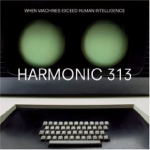|
|
 |
Dusted Reviews
Artist: Harmonic 313 Album: When Machines Exceed Human Intelligence Label: Warp Review date: Apr. 24, 2009 |

|
|
|
 |
As one half of Global Communication and Reload, English ex-pat (now relocated to Australia) Mark Pritchard has left a fairly indelible stamp on early 1990s electronic music, from Reload’s baleful Collection of Short Stories, through Global Communication’s tear-drop pure 76:14 and sublime, exemplary “The Way/The Deep” deep house 12”s. That’s serious pedigree – remember, Pritchard’s collaborator Tom Middleton used to hang with the Aphex Twin in deepest Cornwall, too – and early reports of Harmonic 313 had Pritchard back on form, his previous records on Warp betraying an interest in library music and the kind of eldritch, liminal electronica favored by the Focus Group and their Ghost Box brethren.
When Machines Exceed Human Intelligence starts with the slumped shuffle of “Dirtbox,” which flashes on the weighty torpor of dubstep; Pritchard’s been listening hard to recent developments in dance music, and parts of this album offer his own, skewed take on these forms. Interestingly, though, When Machines… is more convincing when Pritchard’s looking back – the acid-period rhythm box of “Flaash” induces déjà vu as prickly, phosphorescent electronics pulse and twist like LCD displays on overdrive. The jewel-like quality of some of these compositions is charming, and their simplicity and unhurried development is welcome, though they sometimes risk slipping away into nothingness. There are stretches of When Machines… that pass by and refuse to lodge in the memory.
At their very weakest, Pritchard’s productions offer bare trip-hop (with a quasi-futuristic twist) which, being one of the more over-subscribed genres of modern music (at least if one leans on the ratio quality of output to airplay amongst café culture), serves no real purpose beyond a pillow to lean on next time you need to drift off. Pritchard spends a little too much time in this field, and When Machines Exceed Human Intelligence suffers accordingly. But it’s worth making it through these bare patches for the two gorgeous glimmers of light at the end of the album – the magnificently wistful, chime-box soul of “Falling Away” (featuring Steve Spacek on vocals), and the fluorescent elegy of “Quadrant 3,” built from a symphony of strip-lights. It’s a great end to a patchy set whose kernels of greatness suggest Pritchard just needs to stretch his limbs.
By Jon Dale
|







